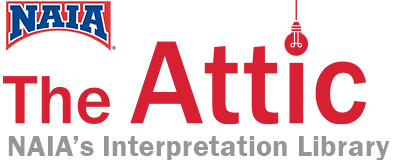This article addresses questions of whether an NAIA coach can hold a separate role outside of their NAIA institution, such as, acting as a scout or an agent for a professional sport organization or, coaching a high school or club team, etc. This information can be found in Article I Section X: Staff Members Representing Professional Sports Organization and Article II, Section C and D: Recruitment (Initial contact, campus visits and tryouts).
Legislative Services receives a number of calls from coaches and athletic directors regarding a current member of an athletic department who may be asked to fill a role or job that is outside of their normal NAIA coaching duties. Our first guidance when approached with this question is that an NAIA athletics department employee is first and foremost a representative of the NAIA membership and therefore must abide by all NAIA bylaws in any situation that could arise while in a dual role.
NAIA Bylaws Article I, Section X, speaks to staff member’s ability to represent a professional sport organization in certain roles. A coach may be asked to fill a role as a sport agent in working with an athlete. An NAIA employee may not receive compensation or gratuities of any kind (either directly or indirectly) for representing a professional sport organization in the role of an agent. Nor may they receive compensation or gratuities for representing an athlete in negotiation of a contract.
We also receive questions on whether an NAIA coach may act as a scout for a professional sport organization. An important distinction will be when the NAIA coach might hold the position of scout. If it is during the academic year of August 1 through May 15, then a coach may act as a scout, but may not receive compensation or gratuities of any kind (either directly or indirectly). However, if the coach is hired during the summer months of May 16 through July 31, then the coach has the ability to be paid for being a scout for the professional sport organization.
Outside of questions regarding sport agents and scouts, another common question is if an NAIA coach may also coach at a high school, club, summer league, etc. This in itself is permissible, however, the dual role can reveal conflict between being an NAIA coach and coaching students who may have identified with a four-year institution. For example, if the high school students have identified at a four-year institution other than the one the NAIA coach currently coaches for, the NAIA coach cannot freely recruit the students, even though they are on the coach’s high school or summer-league team. The recruiting bylaws will come into play for any student who has identified with a four-year institution.
